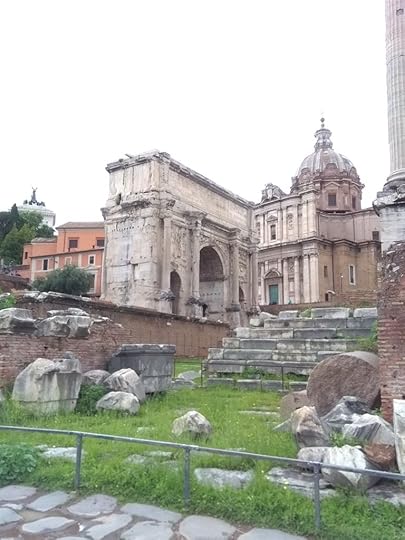Does What Really Happened Really Matter?
I’ve been reading non-fiction a bit lately – something I haven’t done in a good while, not properly. I dip into reference books and the like when I need to find a fact but I haven’t just gone through a chunk of history cover-to-cover in ages, and I felt like it was time. And it got me thinking about history, about sources, and about the key question of a lot of historical source analysis, namely: is any of this stuff even remotely true?
There is no history without sources – if we didn’t have actual records and evidence of the past, I would have a Masters degree in Guesswork. But of course the further back in time you go, as a general rule, the less concrete stuff you have to go on, and/or the more dubious the sources you do have become. It’s part of why I like ancient and medieval history so much more than modern history – the lack of knowledge, the act of interpreting what knowledge we have and drawing conclusions, is much more fun sometimes than just reading a verified eyewitness account of exactly what happened last Tuesday, as in modern history. (Not that modern history is immune to strategic reinterpretation and rewriting – look at every modern politician and how they like to selectively reinterpret the past to make themselves look good, even when there’s documentary evidence of the complete opposite.)
I will turn to ancient Rome because it’s always to hand in my mind (thank you, two degrees). There is a lot of surviving documentary evidence and contemporary-ish history from the period. Hooray! Except of course none of it is wholly reliable. Everything is written with an agenda, and while modern scholarship has adopted the pleasing convention of ‘setting out your argument and motivation at the start’, the ancients, as a rule, didn’t. We have vast numbers of letters from and to Cicero, which paint a stunning picture of the corruption of Republican Rome and the evils of the successive dictatorial Triumvirates. And we also have many letters to and from Julius Caesar, in which he derides the corrupt Republican Senate and speaks eloquently about the benefits of firm, decisive rule by one man (him). Who’s right? Who’s wrong? It’s all wonderfully subjective and that’s the whole point.
 A lot happened on that little brick wall. We assume we know who said what. Do we? And does it matter?
A lot happened on that little brick wall. We assume we know who said what. Do we? And does it matter?But things go even deeper when you get into ancient historians, and the way they look at even more ancient historians. There were many people who wrote clear and decisive accounts of periods in which they lived (or usually periods a bit before when they lived but they definitely, totally, were telling the truth about). Later historians refer to them as fact. Later historians refer to those historians’ ideas, and so on and so forth. Geographers, too, are culprits of this: for every actual visit to far-off lands like Egypt and largely factual account of what they were like, there were ten people who had absolutely sailed that far themselves and seen the people with no heads and three legs that they described in lurid detail. (I’m looking at you, Herodotus. Father of History my arse.) And even the good researchers would ask questions in these new lands, be told wild myths and legends and record them as absolute truth – and usually misinterpret them a bit along the way to make them a bit more spicy for their own readers. This is how we get tales of literal barnacle geese, of beast-headed men and many-headed beasts.
 Yes, geese did grow on trees in the Middle Ages. Topographia Hibernica (c. 1188) – British Library
Yes, geese did grow on trees in the Middle Ages. Topographia Hibernica (c. 1188) – British LibraryIn short, this is how we end up with fantasy. Because in these cracks between the facts, in these mad histories and made-up stories, there are wonders to behold. Adventures that never happened, kings who never ruled, battles that were never fought, gods who were never worshipped. They are talked about as absolutely true all over the place. Maybe people believed in these stories – maybe not. But they were passed down anyway. It took scholars and historians of many later generations to sort the rubbish from the fact – that’s their job, after all, and they are still, in fact, doing it. Until the invention of the time machine, they’ll always be doing it.
And some of these stories will turn out to be really useful allegories for actual real events, or politically motivated, or give some other great insight into ancient culture. And maybe those interpretations will be right – or maybe they’ll be argued, and dismissed, and cast aside as the sort of footnotes that, two thousand years from now, historians will argue over as they try to interpret our culture.
But they make for great stories, regardless. People have been seeing that for thousands of years. Since, and likely before, Lucian, for instance, who took all of what was then the modern field of history and geography, said ‘I can make up better rubbish than this,’ and did. And even in his explicitly made-up work we can find nuggets of truth and insight into the culture of his time. I did. It was an honour to do it, and to reinterpret his reinterpretations as something modern readers could enjoy too.
So the question about history doesn’t have to be ‘is this true’. It can be ‘does it matter’. And it can also be ‘how can I have fun with it?’ Because you can have a lot of fun with it, if you don’t take it too seriously.
Be it understood, then, that I am writing about things which I have neither seen nor had to do with nor learned from others – which, in fact, do not exist at all and, in the nature of things, cannot exist. Therefore my readers should on no account believe in them.
– Lucian of Samosata, The True History



